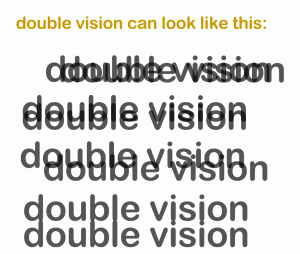Double Vision (Diplopia): Causes, Symptoms & Treatment
Diplopia, commonly known as double vision, is the simultaneous perception of two images, usually overlapping, of a single scene or object.
Seeing people or things as single objects is something we assume as normal, but a change in parts of the vision system can lead to double vision. In this article, we explore the causes, symptoms and treatment of double vision.
Causes of Double Vision
Double Vision can be caused by any defect on some parts of the vision system like the lens, the cornea, the brain, the muscles of the eyes and the nerves that take information from the eyes and send them to the brain. Some of the main causes include:
- Cataracts, which can affect the lens, causing light from an object to split into two, thus leading to double vision.
- When the muscles of the eye are affected, it can lead to ocular myasthenia, which can cause ocular misalignment, and hence, double vision.
- Diabetes or multiple sclerosis can lead to damage of the nerves connected to the eyes and this can cause double vision.
- Strokes, aneurysms, migraines and brain tumors all affect the brain and any of these can cause double vision.
- Infections of the cornea, corneal scars or dryness of the cornea can also cause double vision.
Symptoms of Double Vision
The symptoms of double vision include:
- Headaches
- Nausea
- Cross-eyed appearance
- Eye weakness
- Weak and flabby eyelids and pain when you move your eyes
- Double vision can also occur with no other symptoms, except that you are seeing most things double.
Treatment of Double Vision
The treatment of diplopia depends on what caused it in the first place.
Some treatments include wearing eye patches on the lens of your eyeglasses or on your eyes; temporary prisms can be used to cut down the double vision, and if this works out, they might be replaced by permanent prisms grounded into the lenses of your eyeglasses.
In extreme cases, your optometrist may also suggest resorting to surgery if there is no progress after 12 months of using other methods to treat it. Furthermore, for some diplopia cases that respond to drugs or medicines, the doctor will suggest that for their treatment.
Please remember, no matter how slight the symptoms may be, don’t hesitate to go and see your optometrist if any of these symptoms appear!
Comments are closed.
